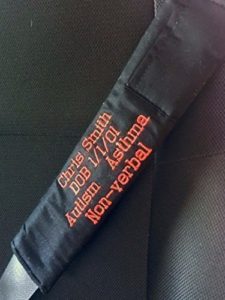Through Boone County Family Resources, a wide array of services and supports are available to individuals with intellectual and developmental disabilities. Support Coordinators assist in assessing each person’s individual needs and coordinate supports to help that person thrive in the community, connect with others, and achieve their personal goals. An important part of thriving in the community is being healthy and safe. BCFR can purchase low-tech safety items to help bring peace of mind to individuals, parents and caregivers.
Jessica’s son, Joe (age 5), was getting out of bed and roaming the home during the night. Often times she and her husband wouldn’t wake up until after he’d gotten into something and made a mess. After catching Joe inside the family car playing with the garage door openers, they knew they needed to try an alarm system. Joe shares a bedroom with his younger brother, so a typical door alarm device would have resulted in not only waking up the parents, but also Joe’s younger brother. Joe’s support coordinator, Barb Friskey, recommended a low-cost motion detector/alarm system with a remote that quietly alerts the parents when Joe gets up. Jessica says they can move the motion detector to any location in the house and it is easy to use. “It has worked wonders and helped us redirect Joe back to bed and helped us avoid big messes all without waking up our other son.”
 In the event of an automobile accident, parents and caregivers may worry about how to communicate to emergency responders that their loved one is non-verbal or has special medical needs. Items such as vehicle seat-belt covers embroidered with an individual’s name, date of birth and other important information have been purchased for several families receiving services through BCFR. “I am aware of a situation where the parent driver crashed, was unconscious and the child in the back seat was non-verbal. Strangers on the scene had no way to know how to interact with the child, which probably only increased the child’s anxiety in the situation,” says Mary Jacks, a support coordinator who works with small children. “The seatbelt cover is a great way to make the child’s needs known quickly to first responders. Families have responded very positively to this inexpensive, embroidered item that has the potential to make a big difference in the event of an emergency.”
In the event of an automobile accident, parents and caregivers may worry about how to communicate to emergency responders that their loved one is non-verbal or has special medical needs. Items such as vehicle seat-belt covers embroidered with an individual’s name, date of birth and other important information have been purchased for several families receiving services through BCFR. “I am aware of a situation where the parent driver crashed, was unconscious and the child in the back seat was non-verbal. Strangers on the scene had no way to know how to interact with the child, which probably only increased the child’s anxiety in the situation,” says Mary Jacks, a support coordinator who works with small children. “The seatbelt cover is a great way to make the child’s needs known quickly to first responders. Families have responded very positively to this inexpensive, embroidered item that has the potential to make a big difference in the event of an emergency.”
Another BCFR family has found success with an engraved shoe identification tag typically used by joggers. Christian (age 15) has very little language skills and gets anxious if he gets separated from his parents in a store or crowd. Sensory processing issues prevent him from wearing an identification bracelet. His support coordinator, Susan Thompson, ordered the engraved tags for Christian to wear on his tennis shoes. “The tags were a smart solution for Christian,” says Susan. “He doesn’t notice them on his shoes, and the parents are comforted in knowing that if they get separated from Christian, someone can easily contact them using the information on the shoe tag.”
A service that is highly recommended by many support coordinators is Smart911.com. This is a free service that enables a family to list any information they would want emergency responders to know such as family members names, birthdates, physical descriptions and photos—including listing any information about disability or special medical needs. If there ever is an emergency and 911 is called, the dispatcher can see the data provided by the family and better instruct the first-responders to the situation.
Other examples of low-tech safety items BCFR has purchased for families include identification bracelets, appliance locks, door alarms, Lifeline alert systems, GPS trackers, and temporary identification tattoos.